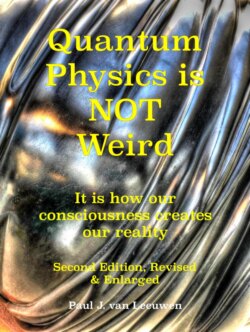Читать книгу Quantum Physics is NOT Weird - Paul J. van Leeuwen - Страница 13
На сайте Литреса книга снята с продажи.
Zeno of Elea (ca. 490 BC) and his paradoxes
ОглавлениеThe assumption by Newton that space and time are continuous is in direct contradiction with the insights of Parmenides and Zeno of Elea. They expressed their ideas by formulating paradoxes that are not as easy to disprove as results of incorrect reasoning, as one might think.
Parmenides was Zeno’s teacher. To support the message of his teacher about the impossibility of diversity and change, Zeno produced several paradoxes that are still known today. With his paradox about the impossibility of movement, Zeno disputed in fact the idea that space is continuous and that each distance can be divided unlimitedly into smaller and smaller parts.
His most cited paradox is his idea of the arrow that will never reach its target because it must travel an infinite number of distances of its trajectory. After the arrow has traveled the first half, it must travel the first half of the remaining distance. After that it must travel again the first half of the remaining distance. This halving of distances is repeated ad infinitum and the arrow will never reach the target because it has to travel an infinite number of distances. There exists even an interesting quantum effect that is named after Zeno and his paradox, to be discussed later.
By applying mathematics, we thought we had eliminated Zeno's paradox: after all, in mathematics the sum of an infinite series can be finite: (1 + 1/2 + 1/4 + 1/8 + 1/16 + 1/32 + ... ad infinitum) = 2. However, are the physical dimensions indeed equally mathematical in character up to infinitely small details? Do physical infinities exist? The mathematical proof of the finiteness of the sum of an infinite row of numbers makes use of limit values at infinity. In the real world we only reluctantly accept infinities. Consider the idea of black holes that imply infinities, singularities, by their existence. Accepting their existence was surely not without resistance and their existence is still hypothetical in the sense that we do not find or create any black holes in our laboratories [10]. Or do we?
The mathematical "proof" of the logical error in Zeno's paradox is a good example of how we allow our concept of reality to be dictated by mathematical models. Anyhow, Zeno’s paradox appears not so easy to be reasoned away and keeps popping up its mocking face.
Zeno did not mean to say that the arrow won’t reach its target in our experience. His paradox was meant to support his message that reality must be an illusion. This idea seems perhaps far-fetched, but it will turn out that it offers an excellent road sign, pointing at how to understand and solve the difficult interpretation problems that quantum physics presents to us.
In this connection, Democritus, a contemporary of Zeno, should also be mentioned. Democritus was a Greek philosopher who proclaimed the hypothesis that all matter consisted of very small indivisible particles, called atoms. The underlying idea was related to that of Zeno and Parmenides, namely that infinity is not a characteristic of nature. You cannot, therefore, keep splitting a piece of matter endlessly. This splitting will always come to an end. Democritus is therefore viewed as the father of the idea of the atom. Incidentally, Zeno in his turn did not wholly agree with the ideas of Democritus.
